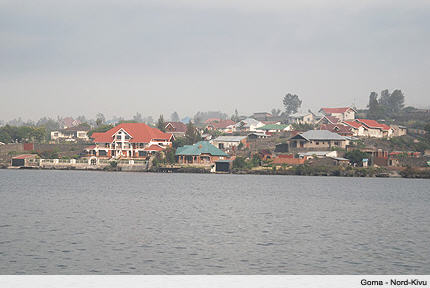
The UN peacekeeping mission in the Democratic Republic of Congo says the situation in the troubled North Kivu province is calm despite the on-going joint military operation against Rwandan rebels.
The mission, known by its French acronym MONUC, has not involved in the attack on the rebel Democratic Forces for the Liberation of Rwanda ( FDLR) although it provides logistic support, a MONUC official said on Saturday.
"We have not assisted in the combats," Leila Zerrougui declared, adding that MONUC is only engaged in logistic support for the joint military operation of DR Congo and Rwanda.
She also disclosed that MONUC has repatriated 216 ex-combatants to Rwanda. "The figures are on the rise. It is about voluntary repatriation after MONUC launched a propaganda operation for all persons who want to return to Rwanda," she said.
According to the UN High Commissioner for Refugees, Rwandan returnees have totaled 1,200 since the Congolese-Rwandan operation started last month.
MONUC reported a calm situation in the conflict-stricken province after some aid agencies expressed fear about refugees' plight. In DR Congo, some politicians also feel unease about the presence of Rwandan troops, which crossed the border twice in the 1990s to attack FDLR rebels.
The Congolese-Rwandan operation, however, was commended by the just ended African Union summit as a positive step to maintain stability in the Great Lakes region, where several countries were embroidered in the 1998-2003 Congo War.
FDLR is linked to the 1994 massacre in Rwanda in which 800, 000Tutsis and moderate Rwandans were killed. The perpetrators fled to DR Congo's North Kivu province afterwards to become a root cause of the central African country's internal conflicts and external tensions with Rwanda.
Spurred by African countries, the two neighboring countries decided in December to join hands to uproot FDLR in search for rapprochement.
Rwandan troops were invited to join the Congolese army last month in the anti-insurgency operation, which also led to the arrest of renegade Tutsi general Laurent Nkunda, whose battle hardened National Congress in Defense of the People had taken large swaths in North Kivu.
The joint operation is going on with a number of FDLR fighters reportedly killed in the jungle.
On Friday, FDLR commander Ignace Murwanashyaka made an appeal for negotiations on condition of security guarantees for his combatants.
In response, Congolese Communication Minister Lambert Mende Omalanga demanded the cornered rebel group lay down arms before talks that should be held in Rwanda rather than in DR Congo, and between FDLR and Kigali rather than with Kinshasa.
Murwanashyaka also said Rwandan Hutus wishing to stay in DR Congo must seek a refugee status "without arms."
With the joint operation progressing on the ground, more and more Rwandans in DR Congo want to return to their home country on the voluntary basis, Congolese officials say.
Some officials even believe the exodus of Rwandan Hutus could render FDLR baseless in North and South Kivu provinces, where the rebel group has been holed up since the 1994 massacre.
President Joseph Kabila expects an end to the joint operation in February, saying Rwandan troops will withdraw within the month.
Related articles
- • UN Security Council Calls on Rwanda to Stop Supporting M23 Rebels in DR Congo (February 22, 2025)
- • Felix Tshisekedi Sworn In as DR Congo President (January 24, 2019)
- • Constitutional Court Declares Tshisekedi Winner of Presidential Election (January 19, 2019)
- • Felix Tshisekedi Vows to Be the President of All Congolese (January 10, 2019)
- • Felix Tshisekedi Elected DR Congo President (January 10, 2019)
- • DR Congo Delays Results of December Election (January 6, 2019)
- • Botswana Urges Joseph Kabila to Step Down (February 26, 2018)
- • No elections in DR Congo in December without electronic voting machines: INEC (February 13, 2018)
- • US Warns DR Congo Against Electronic Voting for Delayed Election (February 12, 2018)
- • Felix Tshisekedi accuses INEC of illegally prolonging Kabila's mandate (October 24, 2017)
- • DRC Seeks Arrest of Presidential Candidate Moise Katumbi (May 19, 2016)
- • Papa Wemba Is Buried in Kinshasa (May 4, 2016)
- • Papa Wemba Awarded Highest National Honor as Thousands Pay Tribute (May 2, 2016)
- • Peacekeepers, Congo Army to Resume Joint Fight Against Rwandan Rebels (January 28, 2016)
- • Political tensions 'running high' in DR Congo ahead of 2016 elections (October 7, 2015)
- • Rights Groups: DR Congo Must Free Pro-democracy Activists (April 13, 2015)
- • DRC Army Putting Pressure on FDLR (April 1, 2015)
- • Police Open Fire on Crowd Protesting Election Law Change (January 19, 2015)
- • Etienne Tshisekedi Evacuated to Belgium for Medical Treatment (August 16, 2014)
- • Southern African Leaders to Meet in Zimbabwe (August 15, 2014)
- • Kerry Calls on Kabila to Honor Constitution (May 4, 2014)
- • Kerry in DR Congo for Security Talks (May 3, 2014)
- • Security Council extends UN mission, intervention force in DR Congo for one year (March 28, 2014)
- • DR Congo Takes Chairmanship of COMESA at Summit in Kinshasa (February 26, 2014)
- • DR Congo Honors Nelson Mandela, Hero and Model for Humanity (December 6, 2013)
- • Congo Army Takes Control of Mbuzi Hill From M23 Rebels (November 4, 2013)
- • Kabila Congratulates Congo Army for Defeating M23 Rebels (October 30, 2013)
- • DR Congo Asks Rwanda to Turn Over M23 Rebel Leaders (July 26, 2013)
- • UN Security Council debate focuses on peace efforts for Africa's Great Lakes region (July 25, 2013)
- • M23 Rebels Kill, Rape Civilians in Eastern Congo: Human Rights Watch (July 22, 2013)







